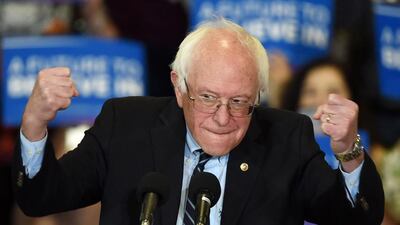Last week Bernie Sanders, the left-leaning self-described democratic socialist, and the divisive and demagogic Donald Trump swept establishment candidates aside to win the New Hampshire primary in pursuit of respectively the Democratic and Republican nominations for president of the United States.
Though poles apart on policy (or what might constitute policy in Mr Trump’s head), both triumphed as anti-establishment icons of resistance to what many Americans feel are the remote and self-interested Washington governing classes.
It was only a short while ago that observers were commenting on the irony of how America would be choosing between two ruling family dynasties – another Bush or another Clinton.
New Hampshire is the latest sign of protest by increasing numbers who feel exiled from the decision-making processes of the political and business elites.
Populism and single-issue protest have become increasingly apparent as people feel themselves to be little more than pawns of impenetrable tiers of national, regional and local authorities, some of them elected, some appointed, most seen as more interested in self-perpetuation than in serving the electorate.
Thus politics is becoming more about protest and exclusion than policy or principle, catapulting some of the more marginal movements and individuals onto the national stage.
In the UK for instance, where recently it used to be impossible to insert a cigarette paper between the main party leaders in terms of background, policy and even personal appearance, the Labour Party is now led by Jeremy Corbyn, a disciple of renationalisation and ardent unilateralist who recently suggested the UK’s nuclear-armed submarines could put to sea without nukes on board. Her Majesty’s most loyal opposition is now led by a convinced republican.
Across the English Channel, meanwhile, the greatest experiment in political and social federalism, the European Union, is floundering as it faces the triple threats of mass migration, terrorism and economic and demographic sclerosis.
Increasing inroads into national affairs and economies by supranational bodies such as the European Central Bank have led to a crisis of accountability whereby many cannot discern exactly how, or by who, their lives are being determined.
In good times this is tolerated more, but in bad times, society looks towards the politics of protest which in turn throws up populist leaders and movements with oversimplified, single-issue platforms.
Everywhere in Europe populist leaders have emerged, from the iconoclastic Beppe Grillo’s Five Star Movement in Italy, to Syriza’s Alexis Tsipras in Greece. Concerns about mass immigration of Middle Eastern refugees has also led to the ascendancy of anti-Muslim, ardently nationalist movements such as Germany’s Pegida and Greece’s Golden Dawn.
Today’s so-called “millennial generation” (those born towards the end of the last century) is singular in that it is the first in the developed world since the end of the second World War to experience declining social mobility and prosperity levels.
Pensions and savings are shot. Post-crash economics continue to work against social mobility and home ownership. Public welfare schemes and social safety nets creak under the weight of an increasingly ageing population.
Settled democratic systems, in a world where the gap between the enormously affluent and those on the margins is becoming increasingly apparent, need to find a way to reconnect and to offer social visions and policies that speak to the electorate. At the moment it is all too easy for the Trumps of this world to gain political traction that feeds on anger rather than aspiration.
All this serves as a reminder of the need for governments to stay in touch with the governed. In the United Arab Emirates, the speed of development and a growing population require new methods of maintaining the personal ties that used to be served well by the old majlis system.
These ties must endure through the growth of institutions, businesses, infrastructure, seats of learning, financial centres and free zones and the exposure to global influences through trade, increased multilateralism and the sheer numbers of expatriates.
The recent Cabinet reshuffle is significant in key areas. It reflects, through its appointments of women and young people to ministerial posts, a kinship with an Emirati society that is overwhelmingly youthful and where women form a significant part of those who graduate and go on to enter the workforce.
The appointment of Noura Al Kaabi as Federal National Council representative in the Cabinet brings to the centre of Government one of the UAE’s iconic female global influencers. She has acted in recent years as a standing challenge to those who would seek to present the country as institutionally or culturally misogynistic.
The announcement of reshuffle also underlines, through the Government’s accompanying pledge to shrink the state, one of the greatest challenges facing a country where so many are employed in the public sector. But this pledge recognises that convoluted tiers of official administration, instead of bringing Government and governed into a closer relationship, can instead drive them further apart. Government works best with a human face.
Martin Newland is a former editor-in-chief of The National

